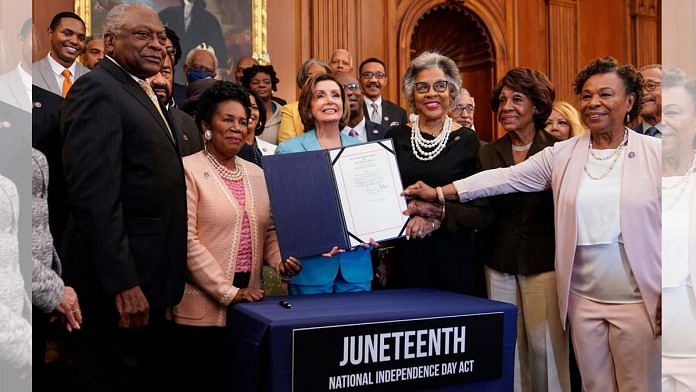New Delhi: US President Joe Biden signed a legislation Thursday declaring 19 June, known as ‘Juneteenth’ in the country, a national holiday to commemorate the end of slavery in the US.
The Bill, which was signed by Biden amid a “jubilant” ceremony, garnered support from both houses of Congress this week.
“Great nations don’t ignore their most painful moments. Great nations don’t walk away. We come to terms with the mistakes we made. And remembering those moments, we begin to heal and grow stronger,” Biden said, before signing the bill.
“I’ve only been president for several months, but I think this will go down for me as one of the greatest honours I will have had as president,” he added.
Kamala Harris, the first Black woman to hold the Vice President office, said: “We are gathered here in a house built by enslaved people. We are footsteps away from where President Abraham Lincoln signed the Emancipation Proclamation. And we are here to witness President Joe Biden establish Juneteenth as a national holiday. We have come far, and we have far to go, but today is a day of celebration.”
Juneteenth marks the end of the American civil war in 1865 and the end of slavery in the country. It has been celebrated by the Black community in the US since the 1800s.
Declaring 19 June as a federal holiday comes a year after the murder of George Floyd, a 46-year-old Black man, by the Minneapolis Police, which triggered nationwide protests under the banner of ‘Black Lives Matter’ that demanded a check on systemic racism.
This is the first federal holiday to be announced in almost 40 years and will join 10 others including Memorial Day, Veterans Day, Christmas Day, 4th of July (American Independence Day) and Thanksgiving.
Prior to this, Martin Luther King Jr. Day was announced as a national holiday in 1983.
Also read: From ‘Cops’ to Oscars, how Black Lives Matter changed the cultural landscape in just a week
End of slavery on 19 June 1865
On 19 June 1865, Union general Gordon Granger arrived in Galveston, Texas, to inform enslaved Blacks about their freedom and the end of the American Civil War. This was two months after Confederate general Robert E. Lee surrendered at Appomattox, Virginia.
Granger’s announcement put into effect the Emancipation Proclamation, which was issued by then President Abraham Lincoln on 1 January 1863 and declared that all persons held as slaves were free.
Texas was the first state that began celebrating Juneteenth after the end of the Civil War.
According to the Congressional Research Service (CRS), at Galveston, Granger had said: “The people of Texas are informed that, in accordance with a proclamation from the Executive of the United States, all slaves are free. This involves an absolute equality of personal rights and rights of property, between former masters and slaves and the connection heretofore existing between them, becomes that between employer and hired labor. The Freedmen are advised to remain at their present homes and work for wages. They are informed that they will not be allowed to collect at military posts; and they will not be supported in idleness either there or elsewhere.”
While Lincoln had emancipated slaves in 1863, several slave owners in the southern states of America continued to practice slavery for the next two years.
Also known as Emancipation Day, 19 June had been celebrated as a holiday in 47 states and the District of Columbia.
Also read: Two books, TV shows and Trump: The story of how Black rage returned in America



